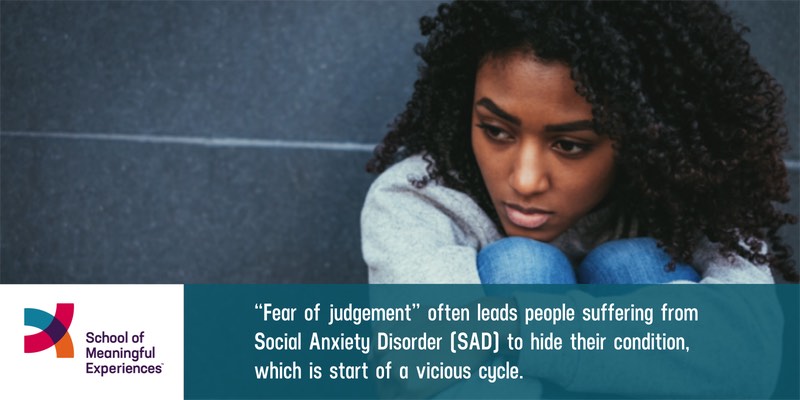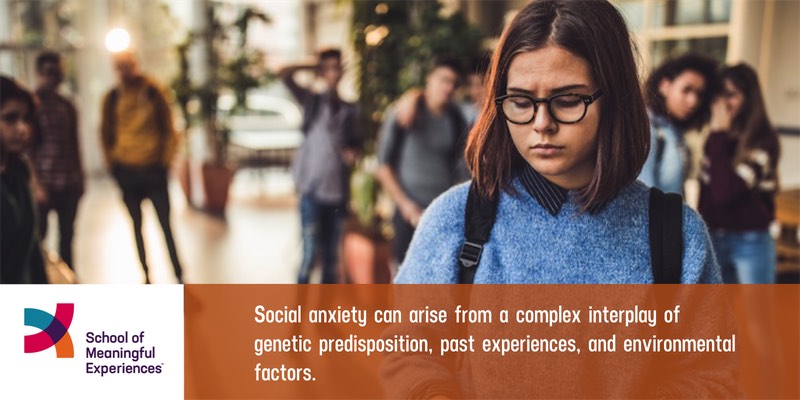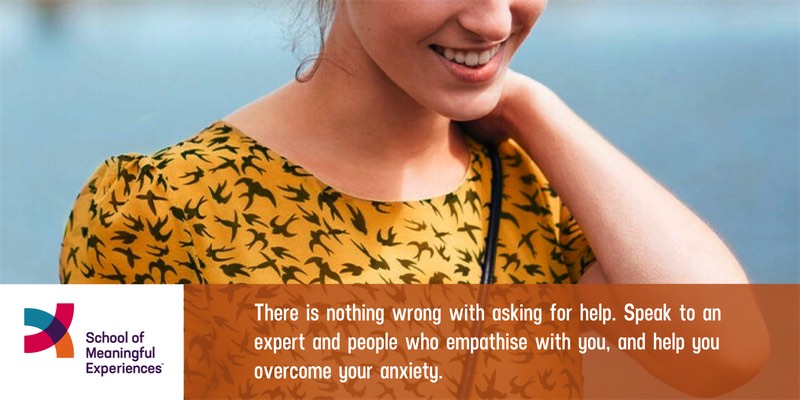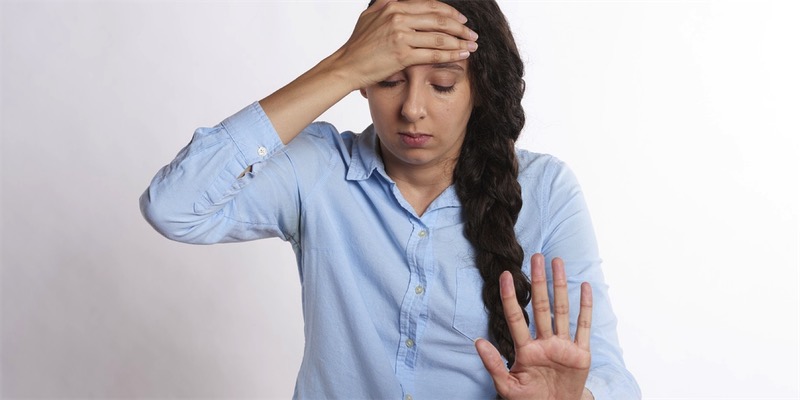If you feel tongue-tied in meetings, find yourself breaking into a sweat at the thought of interacting with your new colleague, or even have difficulties striking up a simple conversation with a stranger, you may have social anxiety. And you are not alone.
Social Anxiety Disorder is one of the most common mental disorders, with more than 200 million people worldwide suffering from it. While its close cousins like Depression and Anxiety were written about in Mesopotamia as early as the second millennium B.C.E., Social Anxiety is a relative newbie, infiltrating psychology literature only about 36 years ago.
In 1985 Psychiatrist Michael Liebowitz and Clinical Psychologist Richard Heimberg initiated action to study social phobia, which was hitherto considered the ‘neglected anxiety disorder’ due to lack of substantial research. In 1987, after much study and revision, ‘generalised social phobia’ was incorporated in The Diagnostic and Statistical Manual of Mental Disorders (DSM) III. But it was in 1995, with the introduction of DSM-IV, that the present-day understanding of Social Anxiety Disorder came into being, replacing social phobia.
Useful resources: a brief history of social anxiety disorder
What is Social Anxiety or social phobia?
Social Anxiety Disorder causes extreme anxiety and fear in social settings. It can be both debilitating and, in some cases, chronic. People with this disorder will find it extremely difficult to talk to strangers, initiate seemingly simple day-to-day dialogues with shopkeepers and the help, among others. They may find social gatherings extremely scary and fear being judged and mocked.
Social Anxiety is very different from shyness, and the two shouldn’t be confused. Shyness is short term, probably without severe underlying issues, and can be solved swiftly. Social Anxiety can be chronic, caused by underlying factors, including brain structure like an overactive amygdala that may cause a heightened fear response, leading to increased anxiety in social situations.
It is also interesting to note that in recent years Social Anxiety has been on the rise. A study conducted on 6,825 individuals from seven countries found that the global prevalence of Social Anxiety was significantly higher than previously reported, with more than 1 in 3 (36%) respondents meeting the threshold criteria for having Social Anxiety Disorder.
Are brain chemistry, genetic disposition, and environmental factors – all well-researched – enough causes for Social Anxiety or are there more? Have diminishing family structures, and the deep integration of technology that has ironically led to a widespread disconnect in real-life relationships contributed to Social Anxiety?
7 Common Symptoms to Identify Social Anxiety Disorder

Social anxiety symptoms can be hard to identify, and it’s often mistaken for other anxiety disorders like generalised anxiety disorder (GAD) or panic disorder, especially since the condition shares many of the same symptoms.
Learning how to spot social anxiety symptoms can help you take charge of your health and get the treatment that you need if you're experiencing them regularly. Here are seven of the most commonly social anxiety disorder symptoms that you should watch out for.
1. Excessive self-consciousness:
Individuals with social anxiety disorder may feel intensely self-conscious in social situations. They are often overly concerned about how others perceive them and fear being judged negatively.
2. Fear of social situations:
A strong and persistent fear of social situations, especially those involving unfamiliar people or situations, is a hallmark of social anxiety disorder. This fear can lead to avoiding social events and isolating oneself.
3. Avoidance behaviour:
People with social anxiety disorder tend to avoid social situations or endure them with extreme discomfort. They may skip social gatherings, avoid making eye contact, or avoid speaking in public.
4. Physical symptoms:
Social anxiety can manifest in physical symptoms such as trembling, sweating, blushing, nausea, rapid heartbeat, or feeling dizzy when faced with social interactions.
5. Anticipatory anxiety:
The anxiety associated with social situations often starts well before the actual event. People with social anxiety may experience intense worry, nervousness, and restlessness leading up to social events.
6. Difficulty in initiating or maintaining conversations:
Individuals with social anxiety disorder may struggle with starting or maintaining conversations. They may feel like they have nothing interesting to say or fear being judged for their speech or opinions.
7. Impaired daily functioning:
Social anxiety disorder can significantly impact a person's daily life, relationships, and work or school performance. It can lead to a withdrawal from social activities and hinder personal and professional growth.
5 causes of social anxiety disorder that you may not know about

Social anxiety disorder can make everyday life feel impossible at times, but the good news is that there are multiple different causes of social anxiety disorder, and they’re easier to deal with than you might expect.
We’ll take a look at five common social phobia causes that you might not have considered before, as well as how to address each problem to reduce or eliminate your social anxiety i.e., how to overcome social anxiety. By learning about the underlying cause of social anxiety disorder and taking proactive measures to change them, you’ll feel better sooner than you think!
1. Fear of judgment
One of the most common reasons for developing social anxiety is fear of judgment. When people feel judged, they often experience fear and embarrassment. Sometimes this fear is irrational and people are worried about what others will think even if they don't have a reason to be.
People with social anxiety also often worry about saying something stupid, embarrassing themselves, or looking bad in front of others. This can lead to avoiding certain situations or interactions with other people altogether so they don't have to face their fears.
The more someone avoids these types of interactions, the more likely they are to develop a phobia because it becomes increasingly difficult to face the fear when it's constantly present.
2. Perfectionism
Possibly the most well-known cause of social anxiety, perfectionism is a response to fear. Perfectionists believe that if they are perfect, they will be loved and accepted. These expectations are unrealistic and can lead to feelings of shame or embarrassment when perfectionists fail at the impossible task of being perfect all the time.
People who suffer from this kind of social anxiety often have high standards for themselves in every aspect of their lives, from their relationships to their work. They also tend to worry excessively about what others think and feel, which can make it difficult for them to enjoy life.
3. Fear of humiliation
Anxiety is a feeling of worry, fear, and uneasiness. It can also be a general feeling of tension or stress. Anxiety can be triggered by many things, such as becoming a victim of an attack or witnessing one person harming another.
If you are experiencing panic attacks for no apparent reason and/or feel constantly on edge or nervous for no reason at all, then it could be due to social anxiety disorder. People who have this condition often have a fear of humiliation in everyday life situations such as public speaking, dating, and meeting new people. The fear becomes so intense that the person avoids these situations altogether to keep from being embarrassed or judged.
4. Being shy
Some people are naturally shy and some people aren't. But when the feeling of being shy starts to interfere with your daily life, it might be a sign that you need help. There are many reasons for feeling shy, and it's important to figure out what is causing your feelings so you can start to feel better.
5 things cause social anxiety disorder which includes: genetics, upbringing, personality traits, environment, and culture. It's important to understand your triggers so you can better handle them or work on building up the skills needed to manage them in the future.
5. Having low self-esteem
According to the Anxiety and Depression Association of America, a person's level of self- esteem is one of the strongest predictors of developing social anxiety. Low self-esteem is caused by being unable to live up to unrealistic expectations.
For example, if someone has low self-esteem because they are overweight and they feel like all other people are skinny, then they will tend to compare themselves with others to feel better about themselves.
This comparison makes it difficult for them to have a conversation with someone else or participate in group activities. They feel inadequate in these situations because their mind is elsewhere and cannot concentrate on what's going on around them. The more they compare themselves with others, the less satisfied they are with their own lives which increases their feeling of inadequacy.
In the latest edition of Conversations with Rakesh, SoME Founder Rakesh Godhwani explores this culmination of Social Anxiety causing factors, the impact of Social Anxiety on our communication skills, and how it can lead to an uncomfortable work experience.
Watch the video here:
Also Read: What is Glossophobia and how can you overcome it?
How to get over Social Anxiety?

Let me give you three suggestions to overcome or tackle Social Anxiety.
No shame in asking for help
It is normal and okay to have social anxiety. It is a mental disorder akin to a physical disorder like cough, cold, or headache. There is nothing wrong with asking for help. Go to a counsellor or an expert who will listen to you, empathise with you, and help you realise that you are suffering from Social Anxiety. This is very critical because you need to understand what’s going on. There are root causes for Social Anxiety, and maybe counselling can help you know how and why you are suffering from it and how to deal with it.
Talk to your friends and loved ones
In your office or university, seek help from a friend or loved one. Tell them you are uncomfortable going into a meeting alone and if they can help by introducing you to some colleagues to warm you up. This person then becomes a mediator and emotional support you need in a room and from whom you can derive strength during meetings and discussions.
Take small steps
You are in a meeting room, people are looking at you, and you are scared. Break the ice by being courageous and saying something simple like, “Good evening, I am pleased to be here.” Will yourself to give a big smile; it will boost your self-confidence, and hopefully, your recovery from the problem of Social Anxiety will start. Once you begin to bring down your anxiety, your confidence starts to go up.
Remember that overcoming social anxiety is a gradual process, and there may be ups and downs along the way. Patience, support, and understanding are essential in helping the individual cope with and manage their social anxiety effectively.




















